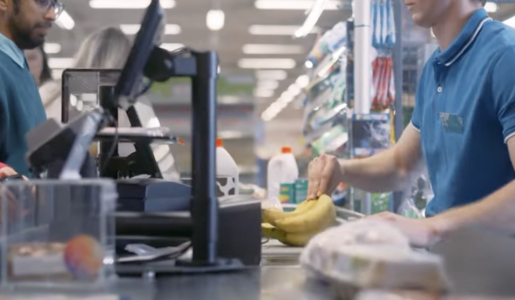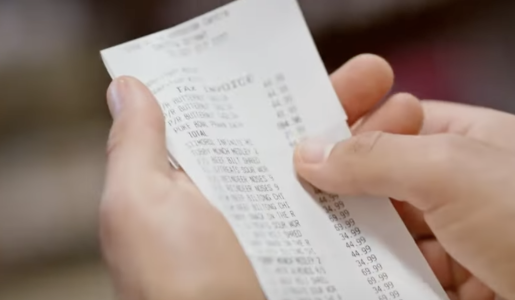Is this the clearest sign yet that a major recession is about to hit America?
- Replies 0
If you’ve found yourself stretching your grocery budget further than ever, you’re not alone—and the latest numbers suggest something much bigger is brewing beneath the surface.
For many, this isn’t about splurging on a new TV or a vacation—it’s about affording the basics, like eggs, milk, and bread.
What’s Happening at the Checkout?
At The GrayVine, we know our readers have seen their share of economic ups and downs.
But this new trend is raising alarm bells among financial experts, and it could be the most distressing sign yet that the US is barreling toward a recession.
According to a new LendingTree survey, a staggering one in four American adults are now using “buy now, pay later” (BNPL) services just to put food on the table.
Let’s break it down: BNPL services like Klarna, Afterpay, and Affirm let shoppers split their purchases into smaller, interest-free payments over a month.

Once a quirky way to buy a new pair of shoes, these services are now being used at major grocery chains—Kroger, Whole Foods, Ralphs, and even through delivery apps like Instacart and DoorDash.
The LendingTree poll found that 25% of adults are using BNPL for groceries, up from just 14% last year. That’s a nearly 80% jump in just twelve months.
Even more concerning, 41% of those users have already missed a payment deadline, risking late fees and a spiral of debt.
Why Are So Many Turning to BNPL for Groceries?
The answer is simple: prices are up, and paychecks aren’t keeping pace. Take eggs, for example.
In March 2025, the average price for a dozen eggs hit $6.22, according to Federal Reserve data. Just five years ago, that same carton cost about $1.40. The pandemic, supply chain issues, and new tariffs have all played a role in driving prices sky-high.
Also read: Is a recession looming? Find out how tariffs might trigger it and when it becomes official
For many Americans—especially those on fixed incomes or living off retirement savings—these price hikes are more than an inconvenience. They’re a crisis.
When the grocery bill comes due and the money isn’t there, BNPL offers a tempting lifeline.
But as LendingTree’s chief consumer finance analyst Matt Schulz warns, “A lot of people are struggling and looking for ways to extend their budget. There’s a lot of uncertainty around tariffs and other economic issues, and it’s all going to add up.”
The Hidden Dangers of Buy Now, Pay Later
On the surface, BNPL seems like a smart way to avoid credit card interest. But there’s a catch: if you miss a payment, late fees can pile up—Klarna, for example, charges up to $7 per missed payment.

And because groceries are a recurring expense, it’s easy to fall into a cycle of debt, using next week’s paycheck to pay for last week’s groceries.
Unlike a one-time purchase, food shopping happens weekly or even more often. If you’re using BNPL every time, those small payments can quickly snowball, leaving you with a mountain of debt and little to show for it.
What Does This Mean for the Economy?
When Americans start financing their groceries, it’s a red flag for the broader economy. It signals that people are running out of options—and that consumer confidence is slipping.
Jamie Dimon, CEO of JP Morgan Chase and one of the country’s most respected financial voices, recently put the odds of a recession in the coming months at 50-50.
Source: NewsNation / Youtube.
Meanwhile, the stock market has taken a hit, with the Dow Jones down more than 5% over the last six months.
Tariffs on imported goods have driven up costs for businesses and consumers alike, and many small businesses are struggling to stay afloat.
How Did We Get Here?
The roots of this crisis are tangled. The COVID-19 pandemic disrupted supply chains and sent prices soaring.
New tariffs on goods from countries like China, Mexico, and Canada have made everyday items more expensive.
Also read: Economists reveal: Is the US on the brink of a recession? See if finances are at risk
And while politicians have promised relief, many Americans are still waiting for prices to come down.
For retirees and those living on fixed incomes, the squeeze is especially tight. Rising costs for essentials like food, gas, and medicine mean that every dollar has to stretch further.
And with 401(k)s and other retirement accounts taking a hit from market volatility, many are feeling the pinch from all sides.
Source: TODAY / Youtube.
What Can You Do to Protect Yourself?
If you’re feeling the pressure, you’re not alone. Here are a few steps you can take to weather the storm:
1. Track Your Spending: Keep a close eye on your grocery bills and look for ways to cut costs—shop sales, use coupons, and consider store brands.
2. Be Cautious with BNPL: If you must use BNPL, set reminders for payment deadlines and avoid using it for recurring expenses like groceries.
3. Seek Help if Needed: Many local food banks and community organizations offer assistance. Don’t hesitate to reach out if you need support.
4. Review Your Investments: Talk to a financial advisor about protecting your retirement savings during market downturns.
Read next: The future’s uncertain, but your finances don’t have to be. Here’s what you need to know.

Have you noticed your grocery bills climbing? Are you or someone you know using "buy now, pay later" for essentials? How are you coping with rising prices? Share your experiences and tips in the comments below!
For many, this isn’t about splurging on a new TV or a vacation—it’s about affording the basics, like eggs, milk, and bread.
What’s Happening at the Checkout?
At The GrayVine, we know our readers have seen their share of economic ups and downs.
But this new trend is raising alarm bells among financial experts, and it could be the most distressing sign yet that the US is barreling toward a recession.
According to a new LendingTree survey, a staggering one in four American adults are now using “buy now, pay later” (BNPL) services just to put food on the table.
Let’s break it down: BNPL services like Klarna, Afterpay, and Affirm let shoppers split their purchases into smaller, interest-free payments over a month.

A quarter of American adults are now using “buy now, pay later” services like Klarna for grocery shopping, a significant increase from previous years. Image source: NewsNation / Youtube.
Once a quirky way to buy a new pair of shoes, these services are now being used at major grocery chains—Kroger, Whole Foods, Ralphs, and even through delivery apps like Instacart and DoorDash.
The LendingTree poll found that 25% of adults are using BNPL for groceries, up from just 14% last year. That’s a nearly 80% jump in just twelve months.
Even more concerning, 41% of those users have already missed a payment deadline, risking late fees and a spiral of debt.
Why Are So Many Turning to BNPL for Groceries?
The answer is simple: prices are up, and paychecks aren’t keeping pace. Take eggs, for example.
In March 2025, the average price for a dozen eggs hit $6.22, according to Federal Reserve data. Just five years ago, that same carton cost about $1.40. The pandemic, supply chain issues, and new tariffs have all played a role in driving prices sky-high.
Also read: Is a recession looming? Find out how tariffs might trigger it and when it becomes official
For many Americans—especially those on fixed incomes or living off retirement savings—these price hikes are more than an inconvenience. They’re a crisis.
When the grocery bill comes due and the money isn’t there, BNPL offers a tempting lifeline.
But as LendingTree’s chief consumer finance analyst Matt Schulz warns, “A lot of people are struggling and looking for ways to extend their budget. There’s a lot of uncertainty around tariffs and other economic issues, and it’s all going to add up.”
The Hidden Dangers of Buy Now, Pay Later
On the surface, BNPL seems like a smart way to avoid credit card interest. But there’s a catch: if you miss a payment, late fees can pile up—Klarna, for example, charges up to $7 per missed payment.

The rise in use of these payment services is seen as a troubling sign of financial stress as families struggle with soaring prices for essentials such as eggs. Image source: NewsNation / Youtube.
And because groceries are a recurring expense, it’s easy to fall into a cycle of debt, using next week’s paycheck to pay for last week’s groceries.
Unlike a one-time purchase, food shopping happens weekly or even more often. If you’re using BNPL every time, those small payments can quickly snowball, leaving you with a mountain of debt and little to show for it.
What Does This Mean for the Economy?
When Americans start financing their groceries, it’s a red flag for the broader economy. It signals that people are running out of options—and that consumer confidence is slipping.
Jamie Dimon, CEO of JP Morgan Chase and one of the country’s most respected financial voices, recently put the odds of a recession in the coming months at 50-50.
Source: NewsNation / Youtube.
Meanwhile, the stock market has taken a hit, with the Dow Jones down more than 5% over the last six months.
Tariffs on imported goods have driven up costs for businesses and consumers alike, and many small businesses are struggling to stay afloat.
How Did We Get Here?
The roots of this crisis are tangled. The COVID-19 pandemic disrupted supply chains and sent prices soaring.
New tariffs on goods from countries like China, Mexico, and Canada have made everyday items more expensive.
Also read: Economists reveal: Is the US on the brink of a recession? See if finances are at risk
And while politicians have promised relief, many Americans are still waiting for prices to come down.
For retirees and those living on fixed incomes, the squeeze is especially tight. Rising costs for essentials like food, gas, and medicine mean that every dollar has to stretch further.
And with 401(k)s and other retirement accounts taking a hit from market volatility, many are feeling the pinch from all sides.
Source: TODAY / Youtube.
What Can You Do to Protect Yourself?
If you’re feeling the pressure, you’re not alone. Here are a few steps you can take to weather the storm:
1. Track Your Spending: Keep a close eye on your grocery bills and look for ways to cut costs—shop sales, use coupons, and consider store brands.
2. Be Cautious with BNPL: If you must use BNPL, set reminders for payment deadlines and avoid using it for recurring expenses like groceries.
3. Seek Help if Needed: Many local food banks and community organizations offer assistance. Don’t hesitate to reach out if you need support.
4. Review Your Investments: Talk to a financial advisor about protecting your retirement savings during market downturns.
Read next: The future’s uncertain, but your finances don’t have to be. Here’s what you need to know.
Key Takeaways
- A quarter of American adults are now using “buy now, pay later” services like Klarna for grocery shopping, a significant increase from previous years.
- The rise in use of these payment services is seen as a troubling sign of financial stress as families struggle with soaring prices for essentials such as eggs, which now cost over $6 a dozen.
- Analysts warn that regular use of “buy now, pay later” for groceries can quickly lead to considerable debt, especially as many Americans shop for food frequently.
- Economic uncertainty, ongoing tariff changes, and falling share prices are prompting fears of an impending recession, with leading figures warning that the situation may deteriorate before it improves.
Have you noticed your grocery bills climbing? Are you or someone you know using "buy now, pay later" for essentials? How are you coping with rising prices? Share your experiences and tips in the comments below!






